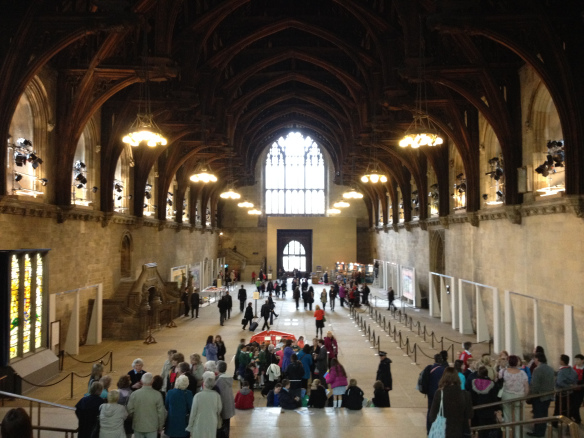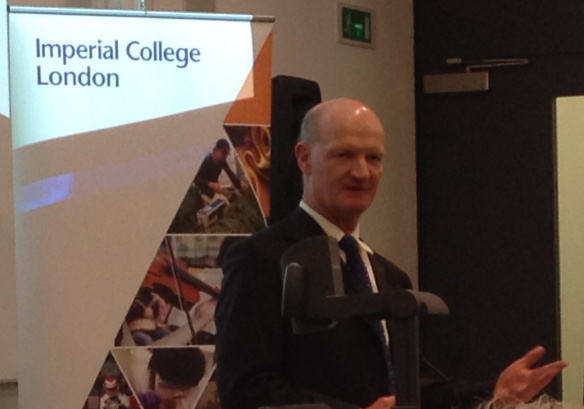The Day I was Allowed into Parliament
Yesterday, this intern was fortunate enough to attend a Parliamentary Committee meeting on Higher Education Reforms, with the Rt Hon (innit) David Willetts MP. Most people reading this will probably recognise him as the current champion for pushing open access in Government policy with the Finch Committee, so seeing him in the flesh was a starry-eyed moment for me. The proceedings were concerned with the White Paper on Higher Education Reform, published November 2011, and the subsequent consultation responses (dispatched on April 5, 2012). As the Geological Society have an input into geoscientific education in the UK, I attended to see if any of the issues we had addressed were raised.

In the Committee meeting room, Willetts was placed in the centre of a pack of political sharks, who looked like they about to rip into a helpless fish. Willetts was promptly grilled, provoked, and otherwise casually insulted by members of the Committee for the next 90 minutes, in a terrifying display of political acumen. This deliberately challenging nature of the Committee is not the norm, according to several of the other spectators present. Throughout the talk, the one thing that struck me was Willetts’ passion – you could tell he genuinely believed in his proposals, and was happy not just to defend them, but accept progressive criticisms on any weaknesses.
The reason for the seemingly scornful display by the Committee was that they believed Willetts and the BIS Council to be “playing games” with the Committee, with Brian Binley (Tory) even going as far as to suggest that Willetts could be held in contempt of Parliament! The reason for this was that BIS only released their response to the consultations of the White Paper the day before the meeting, thus giving the Committee no time to analyse the latest proposed regulations. Obviously, this publication is pretty poor timing, and Willetts reasons for the delay were largely unsatisfactory to the Committee; he cited the Queen’s Speech as a reason for deferral, which was some 4 weeks earlier. Unfortunately, this prompted a series of queries into the timeline of the project, instead of the content of the document being adequately discussed. It was difficult to tell if Willetts was exasperated about these questions, based purely on misunderstanding and lack of communication between the two parties, or if he was being evasive with his consistently reiterative answers.
One of the major points raised by the Committee was the proposal by BIS to move forward without primary legislative backing and without any actual data, which firstly does not provide transparency or Parliamentary input to proceedings, and secondly confounds students who are forced to make quite substantial financial and career decision based on uncertain futures regarding, for example, student loan repayments. There is no existing data regarding the new student fees system, which means that students have to actually commit to the scheme to create the data that they need to make a fully-informed decision, a somewhat counter-intuitive progression. Willetts’ responded to these issues in that he would be using existing legislation as a foundation, with the genesis of new legislation as and when was needed. This was unsatisfactory, as it provided no timeline, and implies a ‘play-it-by-ear’ approach to what, for students at least, is a quite substantive issue. With respect to the student fees repayment system, Willetts assured the Committee that no future financial issues would impact in any significant way.
This lack of data and inadequate timeline were both recurrent throughout the subsequent questions. For multiple policies this meant that although the proposals seemed excellent on the outside (from an academic’s point of view), internally they were based on a weak empirical foundation, with little decision made on the future evolution of the initiative. This issue was hammered home when the Chair outlined the numerous consultations still required for the initiative to function, which had not yet either been initiated or were still in progress. Bailey concluded the session, rather worryingly, stating that the necessary information was not available for students at the time of them choosing their university and future. This circumstance appears to have been brought around by a lack of data and formal assertion of a rigorous timeline. The specific details of the document were postponed for scrutiny based on the late publication of the aforementioned response document.
Later on that same day, I was fortunate to attend a less-formal seminar by Willetts at Imperial College London (ICL), under the banner “Higher Education and Science”. This event was watched over by what Willetts referred to as the “Science Mafia”, the seven heads of the UK research councils, and with a prolific line-up of staff and alumni in the audience.

Willetts was keen to use numerous case studies from ICL during the talk, which largely revolved around how science was being integrated into Governmental procedures, and gave slight insight into how Ministers operate. It was unclear, however, if this meant Willetts was simply well-informed about projects at ICL, or playing to his crowd, or a combination of both. Nonetheless, his passion for progressive higher education within the UK shone even stronger than during the Committee meeting, when he outlined his desire to develop universities into ‘Humboldtian institutions and economic powerhouses’. The core of this revolves around the ongoing, and public, financial debate, which Willetts was keen to highlight the need for more rigorous evidence-based policy (can’t think why he brought this up). He gave a beautiful analogy to potential pathways to implementing his policy, based on art. With the ‘Cezanne approach’, policy would be implemented incrementally (an initiative highlighted earlier as being counter to the Committee’s recommendations, and mis-quoted by Willetts), but with the ‘Picasso approach’, an explosive ‘break-the-mould’ mode of implementation would be applied, conforming to the recommendations of the BIS Select Committee. Either way, Willetts drove home the point that the higher education (and specifically that for Postgraduates) required careful monitoring in the future.
It was a heart-felt talk, with some truly awful questions at the end (one member of the audience was clocked at about 5 minutes just asking her question), and one of which seemed to strengthen Willetts profile within the ICL community. I got to shake his hand at the end, and commend him for his championing of open access in the UK, so all in all, a good day.
Politics is odd.
EDIT: http://www2.imperial.ac.uk/blog/reporter/2012/06/13/minister-gives-keynote-lecture-at-imperial-on-future-of-higher-education/ Here’s the official coverage of Willett’s talk by Imperial College.
Excellent post. I don’t necessarily have the background to follow some of the finer details of British Parliament, but I found this really interesting. It’s a side of things scientists don’t often get to see.